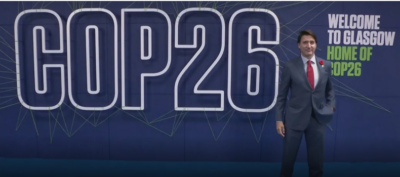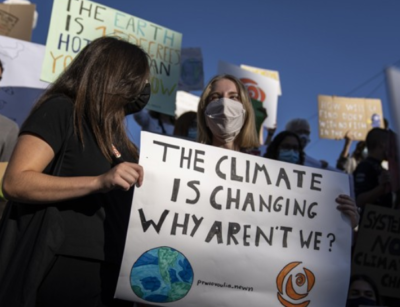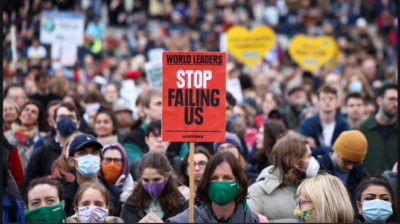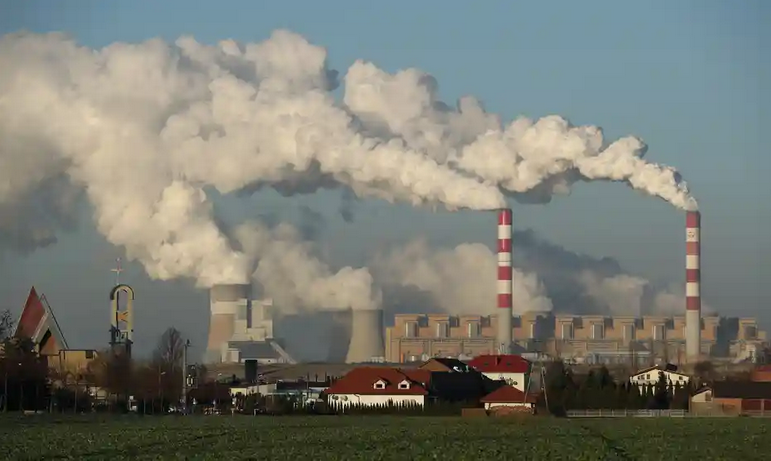 By Ray Rivers
By Ray Rivers
November 19th, 2021
BURLINGTON, ON
After 26 annual conferences of the parties the world community is no closer to halting or even decreasing global warming. The COP spectacle is one of delegates gathering with false hopes and promises of reducing our global carbon footprint, even as that footprint continues to expand without a foreseeable end. After a quarter of a century of trying to reduce global greenhouse gas emissions (GHG) it may be time to admit that it’s not going to happen without a miracle, and that our’s is indeed a dystopian future.

The Prime Minister attended – did Canada make an impact?
COP has become another one of those events where everyone wants to be – youth, indigenous peoples, disappearing Pacific islanders, government bureaucrats and mandarins, environmental organizations, and even the oil companies. It’s another venue to claim everything and get nothing and a chance to get a grant from the rich countries. These extravaganzas have become little more than an annual reunion for the attendees – see you all same time again next year.
I’ve attended a few of these COP meetings, once representing Pollution Probe back in 1998 and caucusing among the environmental groups. There had been a lot of enthusiasm back then. The Kyoto protocol had just been negotiated and the USA, the world largest historical greenhouse gas emitter, was leading the effort. Bill Clinton and Al Gore had helped craft a Kyoto protocol calling for enforceable emission targets with significant financial penalties for those signatory nations who found themselves out of compliance. It was a significant first step.
But by 2003, when I represented Clean Air Canada as part of the business community, that enthusiasm had been replaced by pessimism. GW Bush added to his legacy as America’s worst president ever, and his violations of human rights, by pulling the US out of Kyoto.
American delegates were seen disrupting the proceedings and the halls of the conference were cluttered with oil company representatives making their pitches that climate change was just another hoax.

COP26 had more lobbyists taking part than registered delegates. The people who are going to have to live with a climate that is not going to be kind were out in force. Were they heard?
Once the Americans scuttled the Kyoto deal there was little appetite for the rest of the world to continue, though Europe and even Canada did for a time. Stephen Harper, whose earlier views on global warming had placed him firmly in the denial camp, pulled Canada out of the treaty once he had gained a majority. And he did this, ironically, just as Canada came close to meeting its Kyoto commitment thanks to Ontario’s phase-out of coal.
COP 26 in Glasgow last week was an almost abject failure on so many counts. Despite pleas for climate action by host Boris Johnson, the world’s leaders have settled for business as usual. And that means greenhouse gas emissions are increasing globally instead of declining and will reach their second highest level this year, despite the pandemic.
Fossil fuels are the main culprit and emissions from burning coal the most egregious insult to our climate. India and China came to the rescue of the nasty coal – refusing to allow the term ‘phase out’ to be used in the final communique. China plans to peak its coal use somewhere around 2030 and India sometime later.
Coal still provides almost 40% of the world’s electricity. Yet 40 nations, including Canada, have committed to entirely phase out coal for electricity by 2030. But China, Japan, India, and the United States, which together account of over 75 percent of global coal use have refused to commit to that goal.

We continue to fail them – how might they react in the years ahead?
Some 20 countries and institutions are promising to end direct international public finance for unabated coal, oil, and gas and to prioritize financing for clean energy by the end of 2022. In addition to international financing, Canada provides the highest subsidies for fossil fuel development among all G7 nations. A group calling itself the ‘Beyond Oil and Gas Alliance’ (BOGA) including Costa Rica, Denmark, France, Greenland, Ireland, Sweden, Wales, and the Canadian province (nation) of Quebec committed to taking “concrete steps” to reduce oil and gas extraction.
Perhaps the biggest sign of failure was when the US and China (whose leader hadn’t even bothered attending), announced that they would take the conversation on emission reduction off-line. Gas lighting, double speak, or just an excuse to get out of the room, that bilateral approach is unlikely to amount to anything. China and the USA have to get over unfair trade practices, industrial espionage and Taiwan before they could have a civil discussion on climate change. And China, with the second largest global economy still maintains the façade of calling itself an undeveloped nation.
COP 26 wasn’t a complete waste of time, there were locally sourced ‘sustainable’ sandwiches for the delegates, despite the three hour hybrid/gas guzzler delivery drive from Aberdeen. But this COP will not help the planet keep its temperature rising beyond what scientists have identified as the critical 1.5 degree C temperature increase over the pre-industrial period.
Global net GHG emissions from human activity would have to decline by about 45% from 2010 levels to 2030 in order for us to meet that goal.
Canada’s new climate plan comes close to that goal, but after all, it’s just another plan. This year’s heat dome and the river of rain climate-bomb, which knocked British Columbians into climate reality, occurred when the global temperature was only 1.1 degree C above pre-industrial levels. And the science community tells us that these kinds of climatic effects will only get worse – Ontario may be next.
If not COP, then what can we do? Concerned individuals could always help by consuming less red meat; making their next car an EV (electric vehicle) and converting their appliances to electricity, but the heavy lifting has to come from governments with their regulatory powers.
For example the federal government has committed to banning the sale of new gasoline powered automobiles by 2035, it has mandated the carbon tax, provides incentives to buy an EV, promised new caps on gas emissions and the phase out of coal for electricity by at least 2030. The previous Ontario government phased-out coal and started a program of renewable energy.
The world’s leaders once hoped that the Montreal Protocol, which saw a mostly successful cooperative global effort to eliminate ozone depleting substances, would serve as a model for action on global warming. They created the IPCC (international Panel on Climate Change) which has done a truly amazing job identifying the crisis and what we need to do about it. But none of that matters if the political leaders at those COPs won’t step up and do the right things for the sake of humanity.

Coal is used to generate whatever it is the facility produces.
Some politicians have mused that it may be time to reform global trade rules in favour of protecting the planet’s climate. I recall having a conversation with US officials, back in 1997, who were proposing tariffs on imports from nations with lower environmental standards than the US – sort of levelling the playing field. Conservative leader Erin O’Toole seemed to want to open the door to that kind of thing in his last election platform.
A massive boycott of Chinese-manufactured exports, for example, might help bring President Xi to his senses. We simply can’t wait till 2030 to begin phasing out coal. If the diplomacy of COP doesn’t work, then maybe it is time for a more forceful approach.
Political journalist Rex Murphy, who is as close to a climate change denier as they come, suggested in a tongue-in-cheek opinion piece that maybe it’s time for net zero COP meetings. In fact, looking at the failure of the COP process to reduce, let alone stabilize our carbon footprint, he may have a point.
 Ray Rivers, a Gazette Contributing Editor, writes regularly applying his more than 25 years as a federal bureaucrat to his thinking. Rivers was once a candidate for provincial office in Burlington. He was the founder of the Burlington citizen committee on sustainability at a time when climate warming was a hotly debated subject. Ray has a post graduate degree in economics that he earned at the University of Ottawa. Tweet @rayzrivers
Ray Rivers, a Gazette Contributing Editor, writes regularly applying his more than 25 years as a federal bureaucrat to his thinking. Rivers was once a candidate for provincial office in Burlington. He was the founder of the Burlington citizen committee on sustainability at a time when climate warming was a hotly debated subject. Ray has a post graduate degree in economics that he earned at the University of Ottawa. Tweet @rayzrivers
Background links:
What is COP – Greta Has Spoken – COP 26 Text –
Harper’s Climate Denying History – Ford Lower Gas Prices –




















I am sure it was just an inadvertent oversight, but you failed to mention that Jean Chretien signed us on to Kyoto and then didn’t do a damn thing to abide by it during his long time in office
Sadly, it is obvious that the world at large must experience a major catastrophe before enough people awaken to make a difference. But while I am not at all averse to a monumental reduction in the standing population of stupid people, it is the great variety of life on this planet that I see as the innocent victims. For example, between 1970 and 2010 the world has documented a 60% reduction in wildlife. Nowhere near enough of that was stupid humans. We always read comments such as, We’ll be using illustrated books to explain to our grandchildren what elephants were. And then we move on to read something else, maybe the daily stock exchange reports.
So Sad … if anyone is interested look up the “Arctic Ice” project. It might be a faint glimmer of hope if we can muster the will to do it.
Fortunately, the increasingly rabid musings of Rex Murphy about climate change are now more to be pitied than taken seriously. Wait til some climate disaster hits his beloved Newfoundland, and may become a reluctant convert.
I try an avoid buying anything made in china given what a crappy global citizen they are.
Ray,
Your “….little more than an annual reunion for the attendees…” sums it up perfectly.